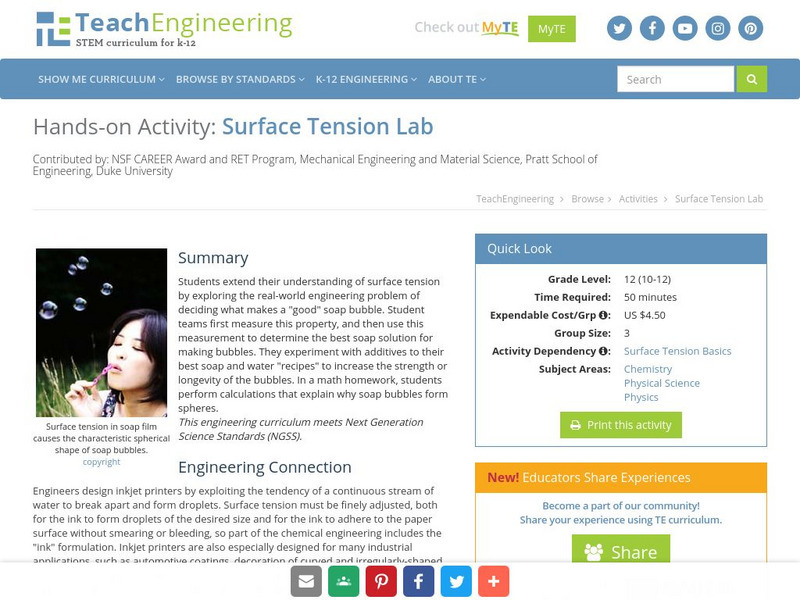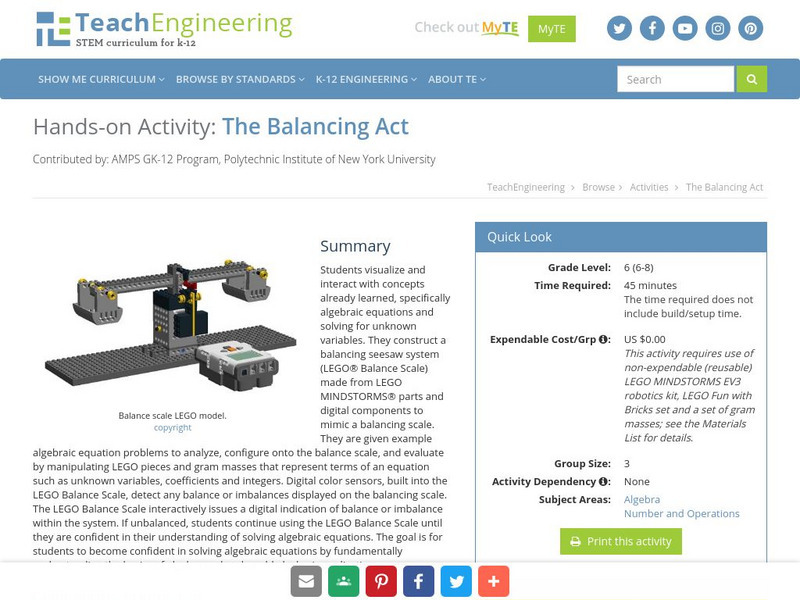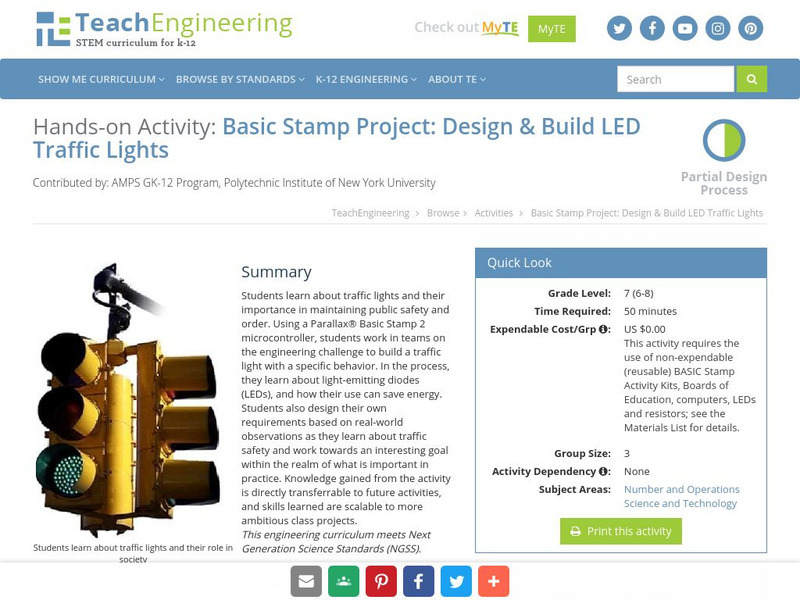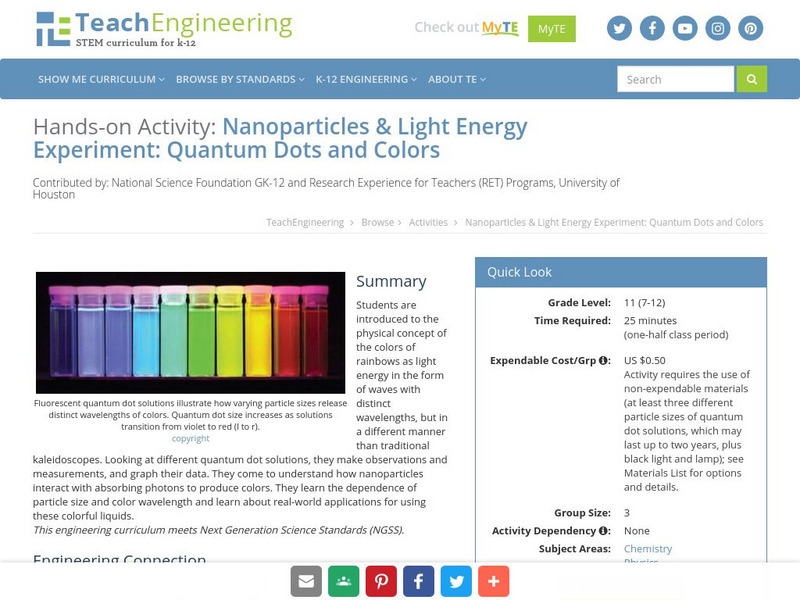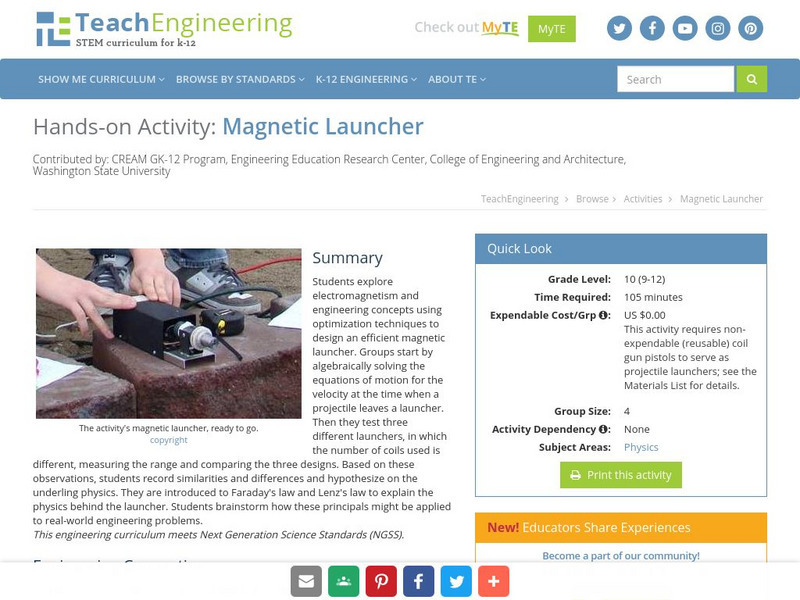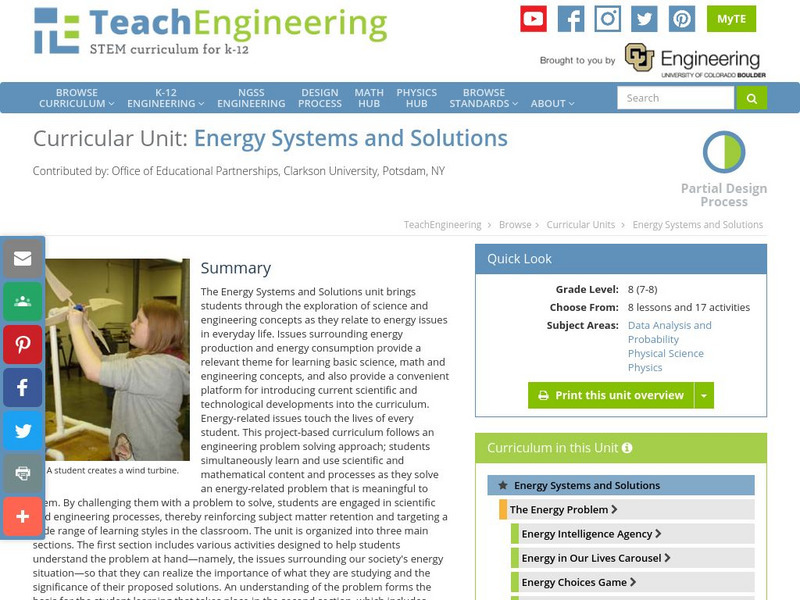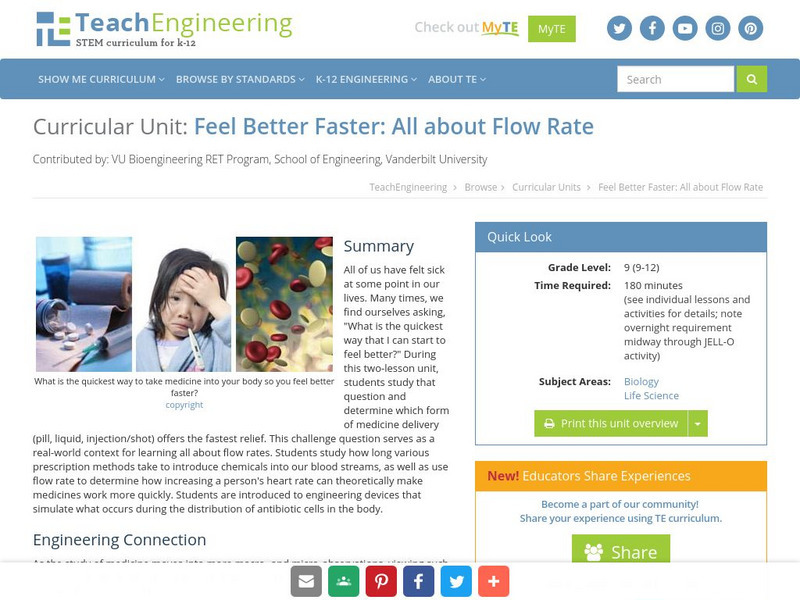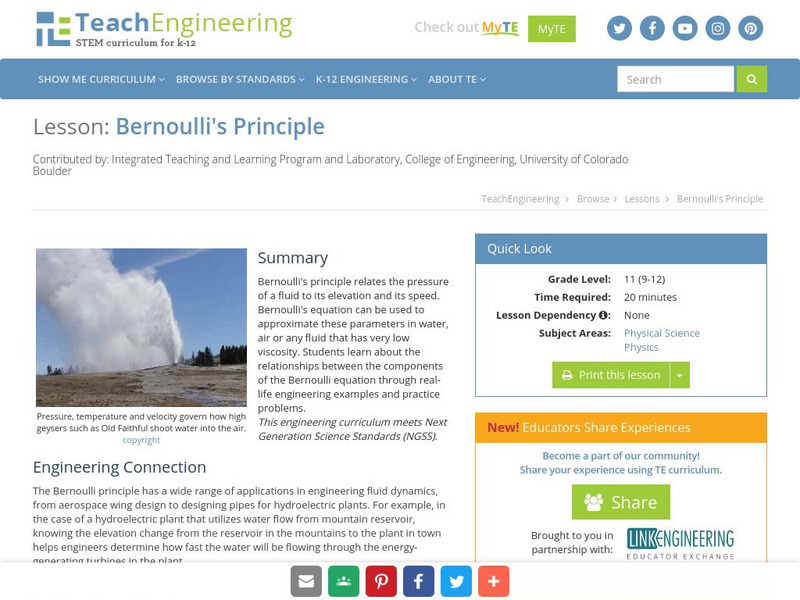TeachEngineering
Teach Engineering: A Place in Space
The students will use a "real" 3D coordinate system. They will have 3 axes at right angles, and a plane (the XY plane) that will be able to slide up and down the Z axis. The students will then be given several coordinates and asked to...
TeachEngineering
Teach Engineering: Surface Tension Lab
Students extend their understanding of surface tension by exploring the real-world engineering problem of deciding what makes a "good" soap bubble. Student teams first measure this property, and then use this measurement to determine the...
TeachEngineering
Teach Engineering: Exploring Capillary Action
Students observe multiple examples of capillary action. First they observe the shape of a glass-water meniscus and explain its shape in terms of the adhesive attraction of the water to the glass. Then they study capillary tubes and...
TeachEngineering
Teach Engineering: Exploring the Lotus Effect
Students test and observe the "self-cleaning" lotus effect using a lotus leaf and cloth treated with a synthetic lotus-like superhydrophobic coating. They also observe the Wenzel and Cassie Baxter wetting states by creating and...
TeachEngineering
Teach Engineering: Start Networking!
To get a better understanding of complex networks, students create their own, real social network example by interacting with their peers in the classroom and documenting the interactions. They represent the interaction data as a graph,...
TeachEngineering
Teach Engineering: Haptics: Touch Command
Students experience haptic (the sense of touch) feedback by using LEGO MINDSTORMS NXT robots and touch sensors to emulate touch feedback recognition. With four touch sensors connected to LEGO NXTs, they design sensor attachments that...
TeachEngineering
Teach Engineering: The Balancing Act
Students are given the opportunity to visualize and interact with concepts they have already learned, specifically algebraic equations and solving for unknown variables. Students construct a balancing seesaw system (LEGO Balance Scale)...
TeachEngineering
Teach Engineering: Linear Equations Game
Students groups act as aerospace engineering teams competing to create linear equations to guide space shuttles safely through obstacles generated by a modeling game in level-based rounds. Each round provides a different configuration of...
TeachEngineering
Teach Engineering: Robotic Perimeter
Students learn and practice how to find the perimeter of a polygonal shape. Using a ruler, they measure model rooms made of construction paper walls. They learn about other tools, such as a robot, that can help them take measurements....
TeachEngineering
Teach Engineering: Traffic Lights
Students learn about traffic lights and their importance in maintaining public safety and order. Using a Parallax Basic Stamp 2 microcontroller, students work in teams on the engineering challenge to build a traffic light with a specific...
TeachEngineering
Teach Engineering: On Track Unit Conversion
Students use three tracks marked on the floor, one in yards, one in feet and one in inches. As they start and stop a robot specific distances on a "runway," they can easily determine the equivalent measurements in other units by looking...
TeachEngineering
Teach Engineering: Quantum Dots and Colors
Students are introduced to the physical concept of the colors of rainbows as light energy in the form of waves with distinct wavelengths, but in a different manner than traditional kaleidoscopes. Looking at different quantum dot...
TeachEngineering
Teach Engineering: Tension Racers!
Students see how different levels of surface tension affect water's ability to move. Teams "race" water droplets down tracks made of different materials, making measurements, collecting data, making calculations, graphing results and...
TeachEngineering
Teach Engineering: Portable Sundial
In this activity students will investigate the accuracy of sundials and the discrepancy that lies between "real time" and "clock time". They will track the position of the sun over the course of a relatively short period of time as they...
TeachEngineering
Teach Engineering: Feel the Stress
Working individually or in groups, students explore the concept of stress (compression) through physical experience and math. They discover why it hurts more to poke themselves with mechanical pencil lead than with an eraser. Then they...
TeachEngineering
Teach Engineering: Magnetic Launcher
Students explore electromagnetism and engineering concepts using optimization techniques to design an efficient magnetic launcher. Groups start by algebraically solving the equations of motion for the velocity at the time when a...
TeachEngineering
Teach Engineering: Energy Systems and Solutions
The Energy Systems and Solutions unit brings students through the exploration of science and engineering concepts as they relate to energy issues in everyday life. Issues surrounding energy production and energy consumption provide a...
TeachEngineering
Teach Engineering: Waves: The Three Color Mystery
Students are presented with a challenge question concerning color blindness and asked to use engineering principles to design devices to help people who are color blind. Using the legacy cycle as a model, this unit is comprised of five...
TeachEngineering
Teach Engineering: Biomedical Engineering and the Human Body
Human beings are fascinating and complex living organisms-a symphony of different functional systems working in concert. Through a 10-lesson series with hands-on activities students are introduced to seven systems of the human...
TeachEngineering
Teach Engineering: Feel Better Faster: All About Flow Rate
All of us have felt sick at some point in our lives. Many times, we find ourselves asking, "What is the quickest way that I can start to feel better?" During this two-lesson unit, students study that question and determine which form of...
TeachEngineering
Teach Engineering: Bernoulli's Principle
Bernoulli's principle relates the pressure of a fluid to its elevation and its speed. Bernoulli's equation can be used to approximate these parameters in water, air or any fluid that has very low viscosity. Students learn about the...
TeachEngineering
Teach Engineering: The Temperature Effect
Students explore how the efficiency of a solar photovoltaic (PV) panel is affected by the ambient temperature. They learn how engineers predict the power output of a PV panel at different temperatures and examine some real-world...
TeachEngineering
Teach Engineering: Maximum Power Point
Students learn how to find the maximum power point (MPP) of a photovoltaic (PV) panel in order to optimize its efficiency at creating solar power. They also learn about real-world applications and technologies that use this technique, as...
TeachEngineering
Teach Engineering: Fun With Nanotechnology
Through three teacher-led demonstrations, students are shown samplers of real-world nanotechnology applications involving ferrofluids, quantum dots and gold nanoparticles. This nanomaterials engineering lesson introduces practical...

